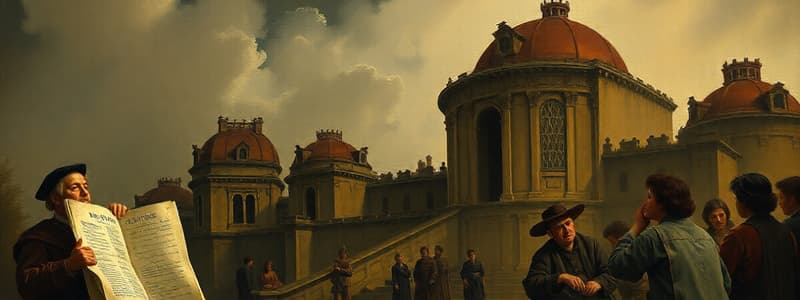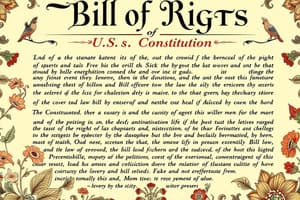Podcast
Questions and Answers
Which scenario directly violates the protections established by the Third Amendment?
Which scenario directly violates the protections established by the Third Amendment?
- During a national emergency, the government mandates that citizens provide temporary housing for soldiers in their private residences. (correct)
- A city ordinance requires homeowners to allow police officers to use their backyard for surveillance during a high-profile investigation.
- A law is enacted forcing citizens to quarter diplomats from foreign nations in their homes at their own expense.
- A landlord evicts a tenant without providing a legally required 30-day notice.
A local newspaper publishes an article containing false accusations about a private citizen, leading to significant damage to that person's reputation. This scenario could be described as which of the following?
A local newspaper publishes an article containing false accusations about a private citizen, leading to significant damage to that person's reputation. This scenario could be described as which of the following?
- Slander, violating the citizen's right to free speech.
- Libel, violating the citizen's freedom of the press.
- Slander, potentially violating the citizen's rights, depending on the newspaper's intent.
- Libel, potentially violating the citizen's rights, depending on the newspaper's intent. (correct)
A protest is organized to advocate for environmental protection policies. Which amendment protects the right of these individuals to gather and express their views?
A protest is organized to advocate for environmental protection policies. Which amendment protects the right of these individuals to gather and express their views?
- The Tenth Amendment, reserving powers to the states or the people.
- The Fourth Amendment, safeguarding their privacy during the protest.
- The First Amendment, guaranteeing the right to assemble and petition the government. (correct)
- The Second Amendment, ensuring their ability to protect the environment.
In which of the following scenarios would the protections of the Fourth Amendment most likely be relevant?
In which of the following scenarios would the protections of the Fourth Amendment most likely be relevant?
A defendant is acquitted of a crime but the prosecution decides to retry the case based on new evidence. Which amendment does this violate?
A defendant is acquitted of a crime but the prosecution decides to retry the case based on new evidence. Which amendment does this violate?
Which of the following best illustrates a situation involving self-incrimination, as protected against by the Fifth Amendment?
Which of the following best illustrates a situation involving self-incrimination, as protected against by the Fifth Amendment?
In a civil case involving a dispute over $10,000, which amendment guarantees the right to a jury trial?
In a civil case involving a dispute over $10,000, which amendment guarantees the right to a jury trial?
A state law imposes an unusually harsh prison sentence for a minor offense, disproportionate to the crime committed. Which amendment provides a potential basis for challenging this law?
A state law imposes an unusually harsh prison sentence for a minor offense, disproportionate to the crime committed. Which amendment provides a potential basis for challenging this law?
Flashcards
1st Amendment
1st Amendment
Guarantees freedoms of religion, speech, press, assembly, and petition.
2nd Amendment
2nd Amendment
Protects the right to bear arms.
3rd Amendment
3rd Amendment
Prevents the government from forcing citizens to house soldiers.
4th Amendment
4th Amendment
Signup and view all the flashcards
5th Amendment
5th Amendment
Signup and view all the flashcards
6th Amendment
6th Amendment
Signup and view all the flashcards
9th Amendment
9th Amendment
Signup and view all the flashcards
10th Amendment
10th Amendment
Signup and view all the flashcards
Study Notes
- The Bill of Rights comprises the first 10 amendments to the Constitution
- These amendments protect individual rights and limit government power
Amendment 1
- Guarantees the rights to religion, speech, press, assembly, and petition
Amendment 2
- Guarantees the right to bear arms
Amendment 3
- Prevents the government from forcing citizens to quarter soldiers in their homes
Amendment 4
- Protects against unreasonable searches and seizures, requiring a warrant based on probable cause
Amendment 5
- Protects against double jeopardy and self-incrimination
Amendment 6
- Guarantees the right to a lawyer, an impartial jury, cross-examination of witnesses, and a speedy trial in criminal cases
Amendment 7
- Guarantees the right to a jury trial in civil cases
Amendment 8
- Prohibits cruel and unusual punishments and excessive bail
Amendment 9
- States that the enumeration of specific rights in the Constitution does not deny or disparage other rights retained by the people
Amendment 10
- Reserves powers not delegated to the federal government to the states or the people
Steps of Procedural Due Process
- 4th Amendment: Arrest
- 5th Amendment: Hearing of charges; a judge or grand jury decides on a trial
- 6th Amendment: Criminal trial
- 7th Amendment: Civil lawsuit
- 8th Amendment: Punishment
Vocabulary
- Press: The right to publish and distribute information freely, protected by the 1st Amendment
- Libel: Written false statements that damage someone's reputation
- Slander: Spoken false statements that damage someone's reputation
- Petition: The right to request government action or change, as guaranteed by the 1st Amendment
- Quartered: Refers to forcing citizens to house soldiers, prohibited by the 3rd Amendment
- Warrant: A legal document authorizing a search, seizure, or arrest, required under the 4th Amendment
- Capital Offense: A crime punishable by death
- Indictment of Grand Jury: A formal charge for serious crimes, decided by a grand jury, as per the 5th Amendment
- Self-Incrimination: Being forced to testify against oneself in a criminal case, protected against by the 5th Amendment
- Due Process: The government must follow fair legal procedures before depriving someone of life, liberty, or property, as guaranteed by the 5th and 14th Amendments
- Procedural Due Process: Requires legal proceedings to be fair and adhere to established rules, as per the 14th Amendment
- Content Due Process: Limits on laws that infringe on fundamental rights, ensuring fairness under the 14th Amendment
- Fines: Monetary penalties for offenses, addressed in the 8th Amendment
- Bail: Money paid to secure temporary release from jail before trial, related to the 8th Amendment
- Lawsuits: Legal disputes between individuals or entities, often involving civil rights or damages, per the 7th Amendment
- Abridging: Reducing or limiting rights, such as freedom of speech or the press
- Assemble: The right to gather peacefully for protests, meetings, or demonstrations, per the 1st Amendment
- Freedom of Expression: The right to communicate ideas through speech, writing, art, or other means, protected by the 1st Amendment
- Redress of Grievances: The right to petition the government to address complaints or injustices, as stated in the 1st Amendment
- Establishment Clause: Prohibits the government from establishing an official religion, found in the 1st Amendment
- Free Exercise Clause: Protects individuals' rights to practice their religion freely, as long as it doesn't violate laws, also in the 1st Amendment
- Procedure: The official steps and processes followed in legal and governmental actions
Studying That Suits You
Use AI to generate personalized quizzes and flashcards to suit your learning preferences.




